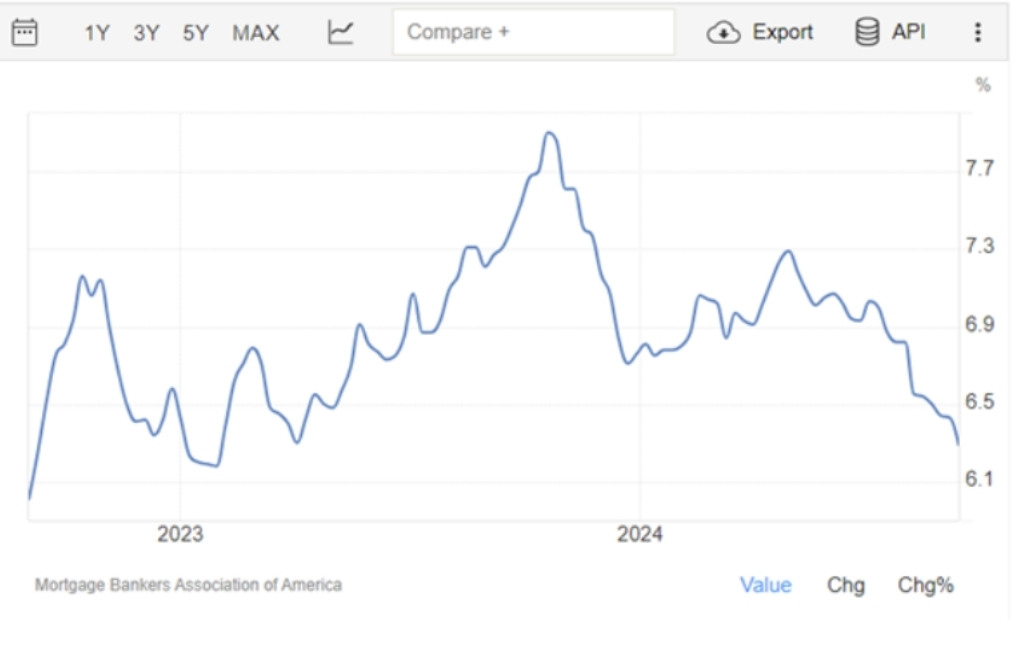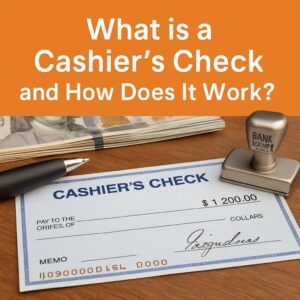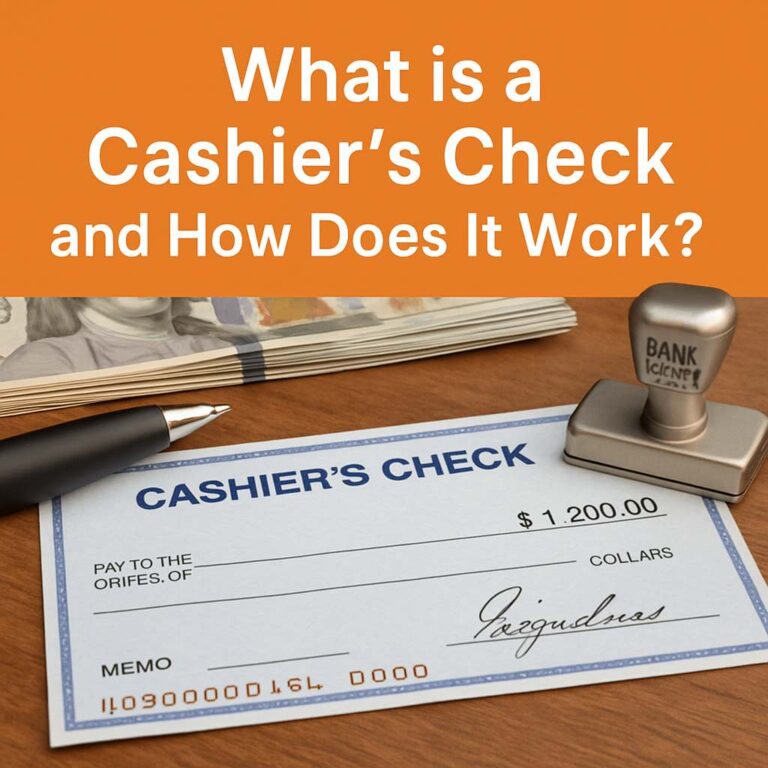In September 2024, the average interest rate for 30-year fixed-rate mortgages with conforming loan balances dropped to 6.29%. According to the Mortgage Bankers Association (MBA), this marked the lowest rate since February 2023. Lower interest rates can make mortgage payments more affordable for homeowners.

Image Courtesy: tradingeconomics.com
One common question homeowners have is, “Are Property Taxes Included in Mortgage Payments?” The answer depends on how your mortgage is set up. In some cases, property taxes are bundled into the monthly mortgage payment, while in other cases, homeowners pay them separately. Understanding this can help you plan your finances better.
This article will explore how property taxes work, whether they are included in mortgage payments and the advantages and drawbacks of bundling property taxes with your mortgage.
What are Property Taxes?
Property tax definition can be given as the fees that homeowners must pay to local, county, or state governments. These taxes help fund important public services such as schools, road maintenance, fire departments, law enforcement, parks, and libraries.
Property taxes are calculated by applying the current tax rate to your home’s fair market value. This value is based on factors like the condition of your home, its location, and how the property is used. For example, a primary residence may qualify for a property tax exemption. If your property’s value increases, your property taxes will go up. Similarly, if the value decreases, your taxes may be lower.
It’s important to note that while property taxes are sometimes referred to as real estate taxes, not all property taxes are the same. Real estate taxes only apply to real property (land and buildings), whereas property taxes can also cover tangible items like vehicles.
Homeowners pay property taxes regardless of whether they own the home outright or are still making mortgage payments. However, the question often arises: are property taxes included in mortgage payments?

How Do Property Taxes Work?
Your lender will often include property taxes in your monthly mortgage payments. While this isn’t always required for conventional loans, FHA loans mandate that property taxes be paid alongside your mortgage. This setup helps ensure that property taxes are taken care of without requiring separate payments from homeowners, simplifying the process for many borrowers.
The property tax process begins with your lender estimating your annual property tax based on your local tax authority’s rates. They then divide that total amount by 12 to calculate your monthly payment. Since these are only estimates, lenders may request a bit extra each month as a precaution. If you pay more than necessary, you’ll receive a refund. However, you’ll need to cover the shortfall with an additional payment if you’re underpaid.
Once your monthly mortgage payment is made, the portion designated for property taxes is deposited into an escrow account. This account holds the funds until the property taxes are due. When the due date arrives, your lender will use the money from the escrow account to pay the taxes directly to your local tax authority. This setup ensures your taxes are paid on time and prevents late fees or penalties.
Both you and your lender will receive notices from your local tax authority when your property taxes are due. Monitoring these notices is crucial to ensure your payments are being processed correctly. If you don’t receive a notice, it’s a good idea to contact both your lender and the tax authority to ensure your taxes are handled properly.
Property tax work involves homeowners paying the tax directly or bundling it with their mortgage payments. Some mortgage lenders collect property taxes as part of your monthly mortgage payment and place these funds in an escrow account to ensure timely payment of property taxes on your behalf.
Difference Between Real Estate Tax and Property Taxes
Understanding the difference between real estate tax vs. property tax is essential for homeowners. Both taxes are important financial obligations, but they apply to different types of property. Real estate tax typically refers to taxes on land and buildings, while property tax can include personal items like vehicles or boats.
Tax Rate Differences
One of the main differences between real estate tax and property tax is the tax rate. Real estate taxes are generally much higher compared to personal property taxes, such as those on vehicles or boats. When asking are property taxes included in mortgage payments, it’s important to know that lenders usually include real estate taxes in monthly payments to ensure they’re paid on time.
Value Assessment and Tax Amount
Real estate taxes are based on the value of your home, which is often much higher than the value of personal property. Even in areas with low tax rates, real estate taxes can amount to thousands of dollars annually. If you’re wondering, are property taxes included in mortgage payments, the answer is often yes, as lenders want to make sure these large sums are paid regularly.
Tax Deductions
Real estate taxes can often be deducted from your federal tax return if you itemize your deductions, offering a potential tax benefit. Personal property taxes may also be deductible, but they typically result in smaller deductions. For those who ask, are property taxes included in mortgage payments, the inclusion of these payments can simplify the process of deducting them when tax season arrives.
Are Property Taxes Included in Mortgage Payments? Explained
So, are property taxes included in mortgage payments? The answer is, it depends on the type of mortgage and the arrangement with your lender. When you make your mortgage payments, a portion may go toward property taxes if your lender requires an escrow account. An escrow account is a separate fund where your mortgage lender deposits a portion of your monthly mortgage payment to cover property taxes and homeowner’s insurance.

Figuring out how property taxes are calculated can be a bit complicated. To start, you need to know the value of your home. Local government tax assessors determine this value, usually every one to five years, based on the assessed property value and the millage tax (or mill levy). Understanding how these factors work is key to calculating your property taxes and knowing whether taxes in mortgage payments are included.
The mill rate determines how much tax is owed per dollar of your property’s assessed value. This rate varies depending on the number of school and city districts your property falls within. To calculate your mill levy, you add up all applicable rates. One mill is equal to one-tenth of a cent, meaning $4,000 of assessed property value would equal $4 in taxes. This mill levy is what you’ll apply to your home’s value to determine the total tax you owe.
Your home’s assessed value is typically based on either its market value or appraised value, depending on where you live. Each area also has an assessment ratio that dictates what percentage of your home’s value will be taxed. This ratio can vary greatly depending on your location, and it’s essential to know which applies to your property when calculating your taxes.
Additionally, you may qualify for exemptions that can lower your property tax bill. Common exemptions include homestead exemptions, religious exemptions, exemptions for homeowners with disabilities, and senior citizen exemptions. These can significantly reduce the amount of tax you owe, making it more affordable.
To calculate your property taxes, you must take the mill rate in your area and divide it by 1,000. Then, multiply that number by your home’s assessed value. For example, if your county’s mill rate is 10 and your home’s assessed value is $500,000, you would calculate the property taxes as follows: 10/1000 = 0.01 x 500,000 = $5,000 in property taxes.
Including taxes in mortgage payments can simplify this process. Your lender may collect property taxes through an escrow account and make the payments on your behalf, ensuring that your taxes are paid on time without you having to manage the details.
When Are Property Taxes Included or Not Included in Mortgage Payments?
Whether property taxes are included in your mortgage payments largely depends on your loan agreement and the lender’s policies. Most conventional loans, FHA loans, and VA loans require an escrow account to collect property taxes and insurance, making property tax payments a part of your monthly mortgage payment. This helps ensure that property taxes are paid on time, which benefits both the lender and the homeowner.
However, if a homeowner has substantial equity in their home or meets certain criteria set by their lender, they may be allowed to manage their property tax payments independently. In such cases, a property tax check is sent directly to the local tax authority by the homeowner when the taxes are due.

When Property Taxes Are Not Included in Your Mortgage
If you don’t have an escrow account with your mortgage, your property taxes will not be included in your monthly mortgage payment. In this situation, you will need to manage your property tax payments separately. Here’s what to expect if you’re responsible for handling property taxes on your own.
First, your monthly mortgage payment will only cover principal and interest, and possibly Private Mortgage Insurance (PMI) if required. Without an escrow account, the portion of your payment that would normally be set aside for property taxes is excluded. This means you’ll be paying less each month, but you must be prepared to handle your property tax payments separately.
Since property taxes aren’t bundled with your mortgage, you’ll be responsible for paying your property taxes directly to your local tax authority. This can be done either through a lump sum payment or, in some cases, by enrolling in an installment payment plan with your tax authority. It’s essential to stay on top of these payments to avoid late fees or penalties.
Without an escrow account, you’ll need to budget for these tax payments on your own. Property taxes are typically due once or twice a year, and you’ll need to ensure you have the funds set aside when the due date arrives. Managing your budget carefully is crucial, as missing a payment could lead to significant financial consequences, including fines or even a tax lien on your property.
When Property Taxes Are Included in Your Mortgage
If you have an escrow account with your mortgage, your property taxes are typically included in your monthly mortgage payments. This system simplifies the process by breaking down your yearly tax bill into smaller, manageable payments. Here’s a step-by-step look at how it works:
First, your lender estimates your annual property tax bill based on the value of your home and local tax rates. This estimate helps determine how much needs to be collected each month to cover the total property tax amount for the year.
Next, this total tax amount is divided by 12, so a portion can be added to your monthly mortgage payment. This ensures that you contribute towards your property taxes regularly, making it easier to manage the cost without needing to save a lump sum.
Your lender then holds the money collected for property taxes in your escrow account. This account is dedicated to covering property taxes and insurance, ensuring that the funds are available when needed.
Finally, when property taxes are due, your lender pays them directly from the escrow account on your behalf. This eliminates the need to handle the payment yourself, ensuring it’s paid on time and helping you avoid late fees or penalties.
This system allows homeowners to set aside money each month for their property tax bill, reducing the financial burden of making a large payment once or twice a year.
How to Calculate Property Taxes Accurately
Property tax calculation involves determining the assessed value of your property and applying the local tax rate. The assessed value is typically calculated by local government assessors, who evaluate the market value of your home. The tax rate, also known as the millage rate, is set by local authorities and varies depending on your location.
For example, if your home is assessed at $250,000 and the local tax rate is 1.5%, your annual property tax bill would be $3,750. Homeowners can use online tools or consult their local tax office to get accurate estimates of their property taxes. Keeping track of property tax calculation is important, especially if you’re paying taxes separately from your mortgage, to ensure that you don’t underpay or overpay.

Benefits and Drawbacks of Including Property Taxes in Mortgage
Including property tax benefits in your mortgage payments offers convenience and peace of mind. However, there are some drawbacks. Understanding both the property tax benefits and drawbacks will help you decide whether to include them in your mortgage.
Benefits of Including Property Taxes in Your Mortgage
Including property taxes in your mortgage payments can simplify your financial life and provide greater security. Here’s how bundling them can benefit you:
Convenience: When you wonder, “are property taxes included in mortgage payments?”, the answer can mean less hassle. Having property taxes included in your mortgage payment eliminates the need to remember separate due dates, as your lender handles these payments on your behalf.
Budgeting: When asking, “are property taxes included in mortgage payments?”, the benefit is clear for budgeting. By bundling taxes with your mortgage payment, you spread the cost over 12 months, making it easier to plan your finances without worrying about large, unexpected bills.
Peace of Mind: If you’re thinking, “are property taxes included in mortgage payments?”, including them reduces the risk of missing a payment. This way, you avoid penalties or tax liens, giving you peace of mind that everything is taken care of automatically.
Drawbacks of Including Property Taxes in Your Mortgage
While including property taxes in your mortgage payments can offer convenience, there are some potential downsides to consider. Here’s what you should keep in mind:
Larger Monthly Payments: Including property taxes in your mortgage means your monthly payment will be higher. While this covers your taxes, it can make your housing costs appear more significant each month.
Less Control: You have less direct control over how and when your property taxes are paid. Instead of managing payments on your own schedule, your lender handles the process, which might need to align with how you’d prefer to manage your finances.
Potential for Escrow Shortages or Overages: Since property tax bills fluctuate, there’s a chance your escrow account might have a shortage or overage. If your lender underestimates or overestimates your taxes, this can result in unexpected adjustments to your monthly payment. If you’re asking, “are property taxes included in mortgage payments?” It’s important to understand these potential variances in monthly costs.
Options for Paying Property Taxes Separately
In some cases, you may be able to separate tax payments from your mortgage. This is typically arranged when the mortgage is first made through an agreement known as an escrow waiver, which allows you to take responsibility for paying your property taxes separately.

Lenders may charge a fee, usually around a quarter-to-half percentage point of the loan amount, to allow an escrow waiver. This arrangement is more common with private mortgages or those sold to Fannie Mae or Freddie Mac, as they do not mandate escrow accounts for property taxes. However, many lenders prefer to require escrow accounts to manage risk more effectively. It’s important to note that FHA-backed loans do not offer this option, as they require the lender to escrow funds for property taxes.
If you’re considering paying property taxes separately, it’s crucial to understand both the potential benefits and the added responsibility. You will need to keep track of property tax due dates to ensure payments are made on time, which could require more financial planning on your part.
Final Words
So, are property taxes included in mortgage payments?
It depends on the arrangement with your lender. Many homeowners have their property taxes included in their monthly mortgage payments, making managing and ensuring timely payments easier. However, some homeowners pay property taxes separately, giving them more control over their finances. Regardless of your choice, understanding how property taxes work and how they are calculated is essential to staying on top of your financial responsibilities as a homeowner.
For more helpful insights on managing your finances and navigating homeownership, be sure to check out our blog at EduCounting. We provide valuable resources to help you make informed financial decisions and stay ahead in your financial journey!








